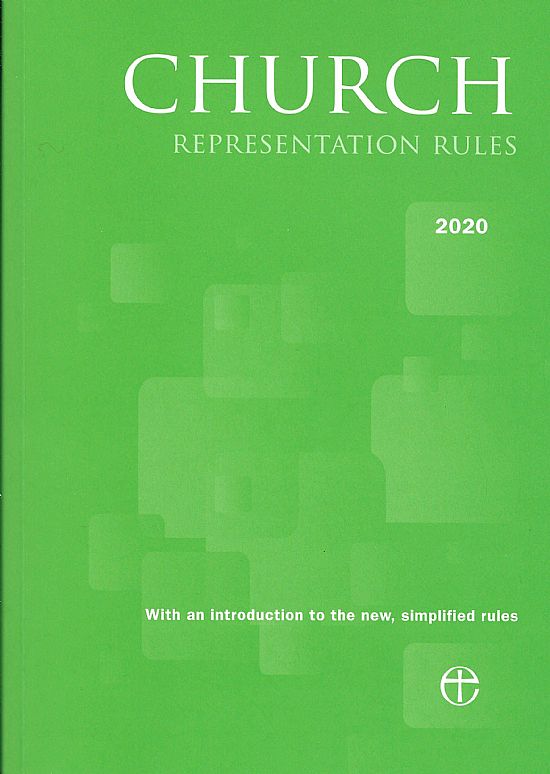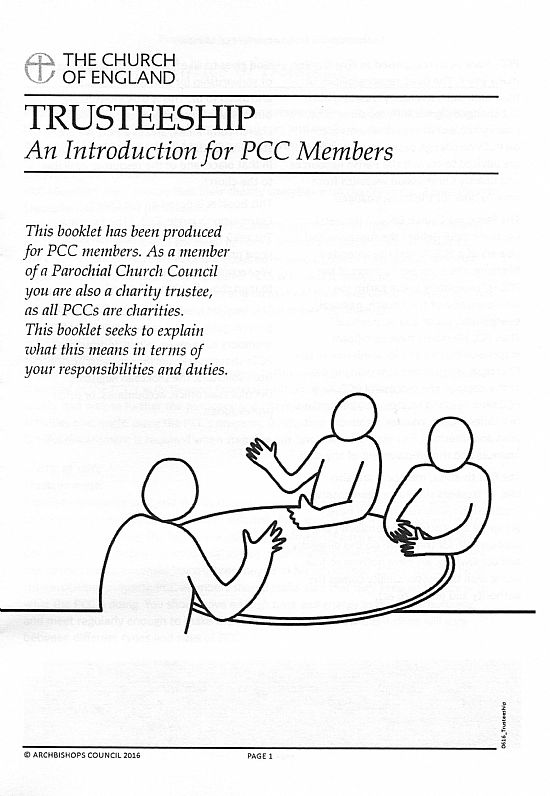PCC Governance
The functions and responsibilities of PCCs are regulated by three principal governing documents, all of which are available online. These are:
Membership
 PCC members are selected at the Annual Parochial Church Meeting (APCM) in before the end of May each year. Membership is governed by the Church Representation Rules and is made up of members of the clergy and church officers (termed ex-officio members), and elected lay members of the church. [CRR Section B (M15)]
PCC members are selected at the Annual Parochial Church Meeting (APCM) in before the end of May each year. Membership is governed by the Church Representation Rules and is made up of members of the clergy and church officers (termed ex-officio members), and elected lay members of the church. [CRR Section B (M15)]
Ex-officio members are the Rector, Churchwardens and the Deanery Synod Representatives. Subject to a decision by the PCC, the Lay Reader is also an ex-officio member of the PCC. [CRR Section B (M15)(h)]
At St Mary's there can be up to nine lay members of the PCC [CRR Section B (M15) (8)]. Nominated lay members must be at least sixteen years old, actual communicants and have been on the Electoral Roll [CRR Part I (1)] of Plumtree Parish for at least six months.
If there are more applicants than places then an election is held at which anyone whose name is on the church electoral roll of the ecclesiastical parish can vote. Alternatively, the PCC may co-opt up to two eligible communicants onto the council [CRR Section B (M15 (1)(k))].
Following an election held at an Annual Meeting, the results are posted as soon as practicable on or near the church door where they remain on display for not less than fourteen days [CRR Section B (M12)]
Functions
The functions of the PCC are regulated by the Parochial Church Councils (Powers) Measure 1956. In a nutshell, in cooperation with the Rector, the PCC is responsible for promoting in the parish the whole mission of the Church, pastoral, evangelistic, social and ecumenical, the church members, the church buildings, and is consulted on matters of general importance to the parish. [PCC(P)M (2)]
A more practical guide to the day-to-day functions of an effective PCC is contained in the Trusteeship section below.
Meetings
From 2020 the PCC need no longer hold a specified minimum number of council meetings in each year. Instead, the PCC is required to hold a sufficient number of meetings to enable the efficient transaction of its business [CRR Section B (M23 (1))].The first PCC meeting occurs immediately following the APCM; it is an abbreviated meeting used merely to elect church officers and set the date of the first substantive PCC meeting.
At least 8 days before each substantive PCC meeting a signed notice specifying the time and place of the meeting is posted at or near the principal door of the church. Not less than seven days before the meeting a notice is posted, or emailed, to every member of the PCC together with the meeting agenda. [CRR Section B (M25)].
St Mary’s PCC has resolved that minutes of PCC meetings are only made available to PCC members. However persons whose names are on the church Electoral Roll may have access to the approved minutes of PCC meetings. [CRR Section B (M28 (6))].
Duties
Members of the PCC are entrusted with the PCC's funds. They must [PCCA 1.5]:
- Always act responsibly;
- Ensure that all decisions are taken for the benefit of the PCC;
- Always act in accordance with the governing documents, principally the PCC (Powers) Measure 1956;
- Not seek personal benefit (commitment to the cause must be the main reason for serving as a trustee).
Financial responsibilities
The PCC has overall charge of financial expenditure in the parish, but operates in close consultation with the Rector as to how income and other funds should be allocated, both in the parish and beyond. [PCC(P)M (7)]
The PCC sets an annual budget, takes steps to raise the money required and monitors the budget during the year. The independently examined or audited church accounts (having been approved by the PCC) are presented for discussion at the APCM. [PCC(P)M (7)]
The PCC Accountability document [PCCA] describes in full the financial responsibilities placed on the PCC by the Charity Commission.
The Church of England has also produced a leaflet outlining "what every PCC member needs to know about church finances".
Annual report
 Church Representation Rules [CRR Section B (M5) (1)(b)] require 'an annual report on the proceedings of the parochial church council and the activities of the parish generally' to be received by the Annual Parochial Church Meeting (APCM). The meeting is then free to discuss it.
Church Representation Rules [CRR Section B (M5) (1)(b)] require 'an annual report on the proceedings of the parochial church council and the activities of the parish generally' to be received by the Annual Parochial Church Meeting (APCM). The meeting is then free to discuss it.
The report is quite separate from the statement or address that the incumbent may wish to make to the APCM.
The Church Accounting Regulations 2006 no longer contain specific requirements as to the information to be included in the Annual Report, but simply refer to the need to comply with the Charities Act, any regulations made thereunder and the current charities statement of recommended practice (SORP). [PCCA 3.1 to 3.10]
The annual report will usually be drafted by the Secretary and the Treasurer of the PCC, but some PCCs may wish to involve others in the drafting. It is a significant document in the life of the church and should be prepared in that light rather than as a chore to be completed annually.
The PCC must adopt the report before it is presented to the APCM and it must be dated and signed by the chairman of the PCC meeting at which it was adopted. Ideally an early draft should be shown to the PCC.
Trusteeship
 A PCC is a charity; as such, its members are Trustees and thus subject to the regulations of the Charity Commission, rather than those of the Church of England. [PCCA (3)]
A PCC is a charity; as such, its members are Trustees and thus subject to the regulations of the Charity Commission, rather than those of the Church of England. [PCCA (3)]
The Church of England has published a helpful booklet ( Trusteeship - an introduction for PCC members) which explains the duties of PCC member trustees in practical terms. It includes seven marks of good governance for an effective PCC:
Trusteeship - an introduction for PCC members) which explains the duties of PCC member trustees in practical terms. It includes seven marks of good governance for an effective PCC:
An effective PCC…
- is clear about its purposes, mission and values, and uses them to direct all aspects of its work. PCC Members always act in the best interests of the PCC, making balanced and adequately informed decisions, and thinking about the long term as well as the short term;
- has adopted structures, policies and procedures which enable it to achieve its mission and aims and meet its objectives efficiently;
- sees sound governance as an important part of its stewardship. It has appropriate procedures in place and manages any conflicts of interest appropriately;
- manages and uses its resources (including finance, skill, knowledge, experience and assets) so as to achieve its potential. It plans and budgets effectively, including periodic review;
- views accountability and transparency as key values, and recognises that it is accountable to wider constituents. It communicates effectively, explaining its activities and decisions in an open and transparent way whilst maintaining confidentiality where appropriate;
- is flexible enough to adapt to change appropriately. Avoiding complacency, the effective PCC will want to increase its effectiveness in meeting its core object of promoting in the parish the whole mission of the Church;
- acts with integrity, and in accordance with its values.
A printed copy of the booklet is available at the back of church.
Summary
This page attempts to summarise the duties and responsibilities associated with being a member of St Mary’s PCC, so that prospective nominees can make an informed decision. However you are referred to the governing documents (see links at the top of this page) for more detail.
The PCC is a vital resource, crucial to helping St Mary’s meet the unique challenges facing a rural Anglican Parish Church in the 21st century.
Key to references
CRR: Church Representation Rules 2020
PCC(P)M: Parochial Church Councils (Powers) Measure 1956
PCCA: PCC Accountability - The Charities Act 2011 and the PCC 5th Edition